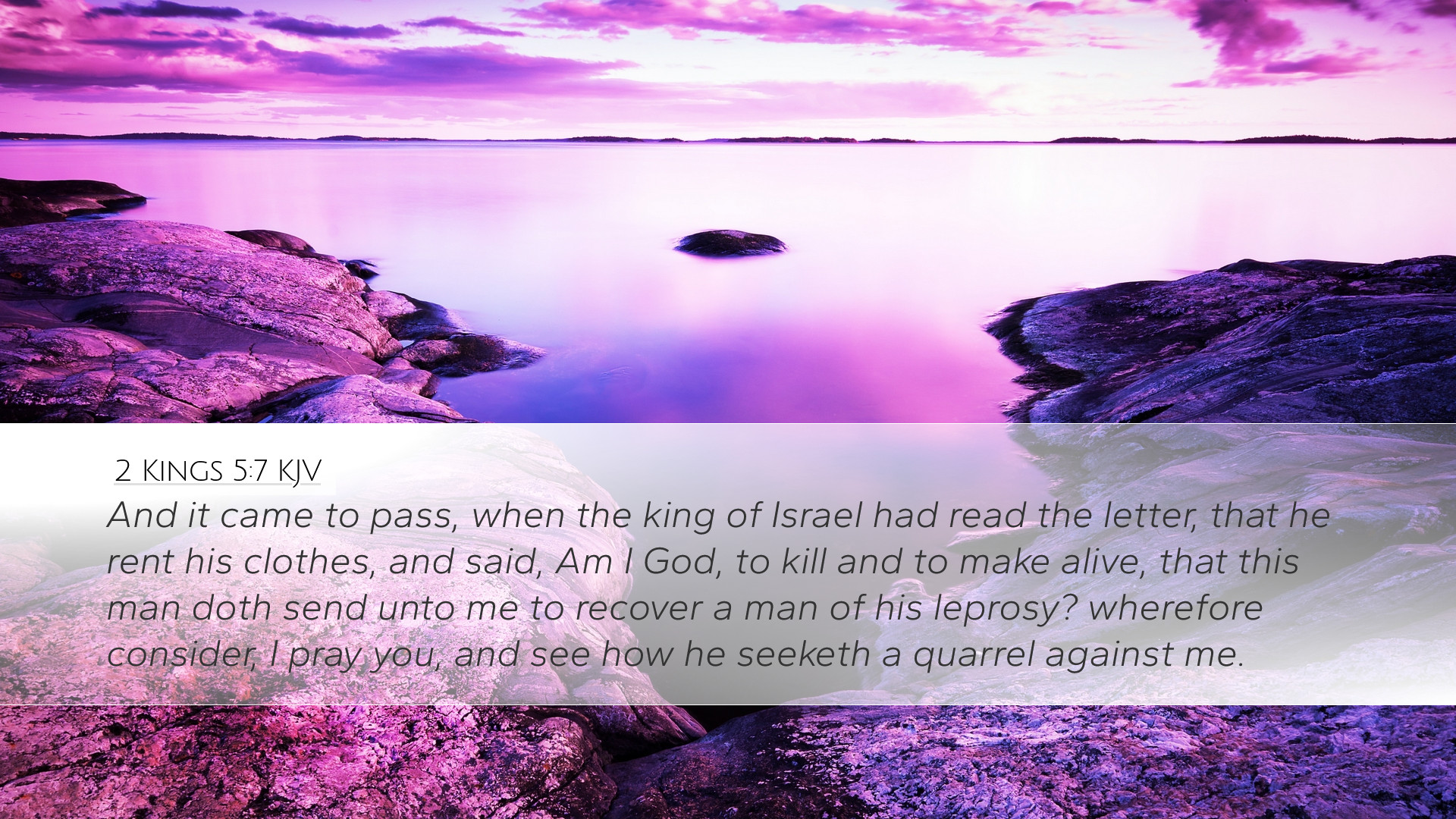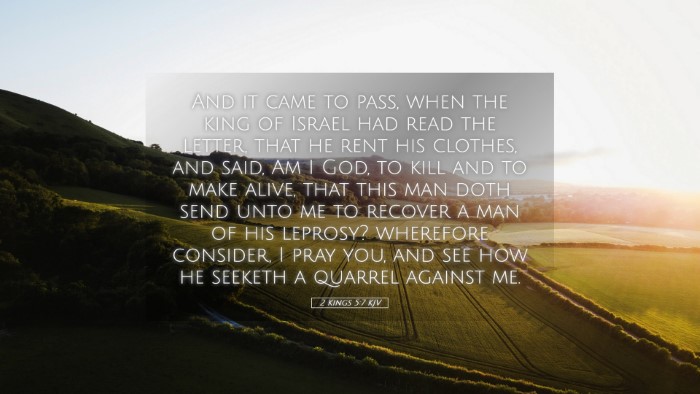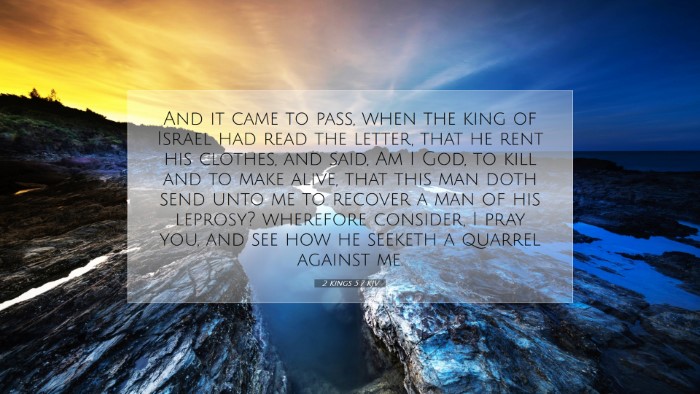Commentary on 2 Kings 5:7
Verse Reference: 2 Kings 5:7 - "And it happened, when the king of Israel read the letter, that he tore his clothes and said, 'Am I God, to kill and to make alive, that this man sends a man to me to heal him of his leprosy? Therefore please consider, and see how he seeks a quarrel with me.'
This verse captures a profound moment in the narrative of the healing of Naaman the Syrian. It reveals the complexity of the situation faced by the King of Israel and highlights key theological insights concerning authority, divinity, and human limitation.
Contextual Background
The story of Naaman is set against the backdrop of Israel's historical conflicts with Syria. Naaman, a high-ranking official, suffers from leprosy, a condition that both physically and socially isolates him. His encounter with the Israelite prophet Elisha provides a crucial turning point not only for his personal healing but also for Israel's relationship with neighboring nations.
The King's Response
Tearing of Clothes: The act of tearing one's clothes is symbolic of great distress and indicates the gravity of the situation that the King of Israel perceives. In this cultural context, clothing was a significant symbol of identity and status. When the king tears his clothes, it signifies both his despair and his inability to meet the expectations placed upon him.
“Am I God?” This rhetorical question posed by the king reveals a significant theological insight: he recognizes the limitations of human authority. There is a clear delineation between what belongs to God and what falls within human capacity. The king understands that the power to heal lies beyond his capability, which serves as a fundamental acknowledgment of divine sovereignty.
Theological Insights
The situation presented in this verse raises profound questions about divine authority and human roles. The King of Israel, representing the nation, expresses the prevalent view of the time: that miraculous healing and life-giving power were exclusively within God's realm. This serves to highlight the inadequacy of political power when faced with spiritual or health crises.
- Divine Sovereignty: The king’s statement accentuates the sovereignty of God in matters of life and death. It emphasizes that healing and restoration are acts of divine intervention.
- Human Limitations: The response of the king underscores a vital theme within scripture—the recognition of human limitations in the face of divine omnipotence.
- Seeking God: The king’s despair also emphasizes the need for divine inquiry. The desperation for a solution points toward the necessity of seeking God in times of crisis.
Commentaries from Various Perspectives
Matthew Henry
Matthew Henry, in his commentary, notes that the king’s reaction is not merely panic but reflects a deep-seated anxiety regarding his inability to meet the expectations placed on him. He comments on the contrast between the king’s despair and Elisha's calmness later in the narrative, indicating that faith and true understanding of God’s power do not rely on human authority.
Albert Barnes
Albert Barnes highlights the implications of the king’s response in relation to prayer and dependence on God. He suggests that the king's tragic misunderstanding of his role may lead to a lack of faith among the people of Israel, who are witnessing their leader’s panic rather than a display of trust in God’s sovereign power. Barnes encourages readers to recognize that while leaders have authority, ultimate power lies in God alone.
Adam Clarke
Adam Clarke provides an in-depth examination of the socio-political ramifications of the king’s dismay. He points out that the king feels trapped between maintaining his authority and recognizing his impotence in the face of Naaman's affliction. Clarke emphasizes the king's need for a prophet—a mediating figure which highlights the importance of prophetic ministry in guiding nations toward healing and understanding God’s will.
Application for Today
This verse serves as a potent reminder for contemporary believers, particularly for pastors and theologians, regarding the need for reliance on God's power rather than solely on human capabilities. It calls forth a reflection on how leaders respond to crises and the importance of pointing the community towards faith-based solutions.
- Leadership in Crisis: Leaders today can learn from the king’s initial reaction. When faced with challenges, it is crucial to first seek divine wisdom and guidance.
- The Role of Faith: Believers are encouraged to approach challenges with prayer and a deep understanding of God’s authority, ensuring that faith is placed above doubt.
- Prophetic Voices: Just as the king later turns to Elisha, today’s leaders should be open to the counsel of wise, faith-filled individuals who can help guide them towards God’s solutions.
Conclusion
2 Kings 5:7 encapsulates a significant moment of struggle between human authority and divine power. The responses depicted in this verse challenge pastors, students, and theologians to engage deeply with the nature of God’s sovereignty and the necessity of faith in moments of crisis. The insights drawn from the commentaries of Henry, Barnes, and Clarke provide a rich tapestry for understanding the spiritual dynamics at play and encourage a contemporary application that emphasizes the importance of seeking God's intervention in our lives.


